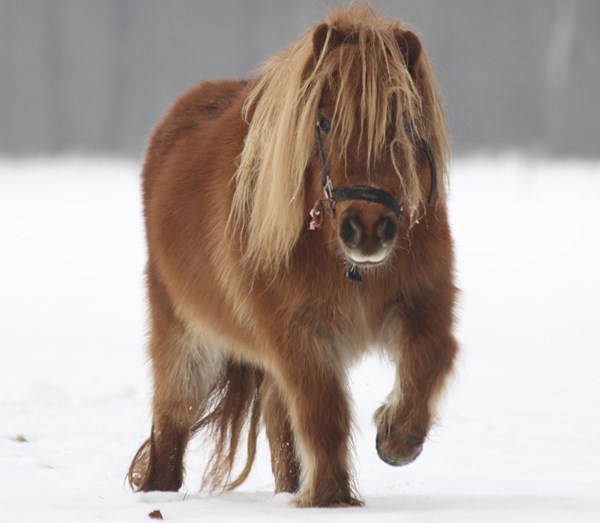 Credit: Thinkstock Unless you want a long haircoat in winter, you need to blanket early.
Credit: Thinkstock Unless you want a long haircoat in winter, you need to blanket early.A horse’s winter coat can be an excellent insulator, but its insulating value is lost if it gets wet. If the hair is wet or full of mud, air is excluded, reducing its insulating value and increasing heat loss. As little as 0.1 inch of rain can cause cold stress by matting the hair and reducing its insulating value.
It is important to keep the horse dry and sheltered from moisture. As expected, a horse with a thicker hair coat can retain more heat.
Research has been conducted on the benefits of blanketing a horse to reduce the effects of cold weather. Most horses are blanketed for various reasons (show schedules) or due to personal beliefs of the horse’s owner. However, blanketing a horse is necessary to reduce the effects of cold or inclement weather when:
- There is no shelter available during turnout periods and the temperatures drop below 5°F, or the wind chill is below 5°F
- There is a chance the horse will become wet (not usually a problem with snow, but much more of a problem with rain, ice, and/or freezing rain)
- The horse has had its winter coat clipped
- The horse is very young or very old
- The horse has not been acclimated to the cold (i.e. recently relocated from a southern climate)
- The horse has a body condition score of 3 or less
It is equally important that the blanket fits the horse. Horses can develop rub marks or sores where the straps secure the blanket if it fits improperly. If the horse is blanketed continuously, the blanket should be removed daily, inspected for damages, and repositioned. Make sure blankets are kept dry and do not put a blanket on a wet horse; wait until the horse is dry before blanketing. Keep in mind a horse will continue to develop a natural winter coat until December 22, while days are becoming shorter. Horses begin to lose their winter coat, and start forming their summer coat, as the days begin to get longer on December 23. Blanketing before December 22 will decrease a horse’s natural winter coat and may result in the need for winter?long blanketing.
This article was written by Marcia Hathaway, PhD, University of Minnesota. Sign up for the University of Minnesota’s Horse newsletter.


